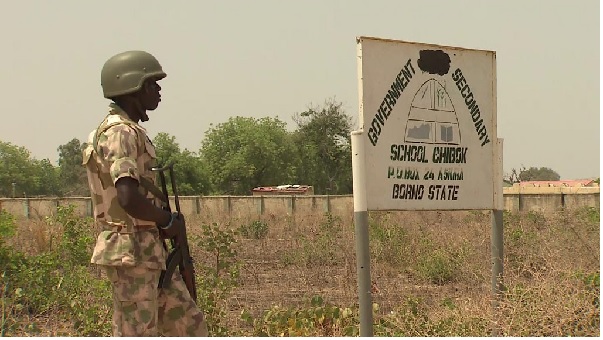The security of life and property are among the major reasons that inform one’s decision to settle to live or do business in a place. As a result of an increased spate of crime that has ravaged Nigeria in recent years, some places have become too dangerous to live in. Crimes like terrorism, banditry, hooliganism, kidnapping, and more contribute to making a place too dangerous for living and doing business. In this article, we’d be discussing the 10 most dangerous places in Nigeria. Read on.

The 10 most dangerous places in Nigeria would be discussed below:
-
Chibok, Borno state
Chibok is one of the most dangerous places to live, in Nigeria. For over a decade now, this Local Government Area in the southern part of Borno state has endured over 72 terrorist attacks. A notable example of such attacks was the 2014 kidnapping of nearly 300 secondary school girls by the Boko Haram sect. To this day, 100 of those girls are still unaccounted for. It seems that Chibok has been abandoned to its own devices as unscrupulous elements reign supreme in the area, kidnapping, killing, and extorting the inhabitants.
-
Zamfara State
Zamfara is one of the most dangerous places in Nigeria. Bandits numbering over 30,000 operating in the state impose harvest levies on farmers while burning million-naira farms of those who refuse to pay. Violent attacks involving gunfire and explosives are also rampant across the state, sometimes resulting in mass killings. Kidnapping is also rife in Zamfara with motorists, local communities, and transportation hubs being targets. Although there are military interventions in the state from time to time, these atrocities continue as the troops aren’t enough to man every troubled town and village in the state.
-
Adamawa State
Adamawa has been ranked among the most dangerous states in Nigeria for some years now. The reasons why this is dangerous are because of insurgency, banditry, and other forms of violent attacks that are frequent occurrences across the state. There are active cells of both Boko Haram and the Islamic State of West Africa Province (ISWAP) that are still operating in some parts of the state, which raises risk concerns to severe levels for living, doing business, and traveling in Adamawa.
-
Yobe State
In the past few years, Yobe has been mentioned as one of the hotspots of the Boko Haram insurgency and other armed violent groups. These groups are known to abduct people for ransom, extort farmers of their harvest, attack people of varying religious beliefs and even mass killings. And since all local government areas in Yobe cannot be manned by troops of the Nigerian military, these anti-state elements continue to devise means to exert their authority and carry out campaigns of violence on inhabitants of the state.
-
Plateau State
The north-central state of Plateau is one of the most dangerous places in Nigeria. In the last decade, no state in Nigeria has witnessed more communal and religious crises as Plateau has. Whenever these communal and religious crises that have continued to reoccur happen, hundreds of persons lose their lives, while many others become displaced. In 2022 alone, there were reports of such clashes in Kanam, Wase and Bassa local government areas, in which many people were killed, including children.
-
Taraba State
Although Taraba is in the troubled north-central part of the country, this predominantly agrarian state has been spared by the Boko Haram insurgency. However, Taraba has been the theatre of clashes between farming communities, as well as herder-farmer clashes. The ripple effects of these unending clashes bring about increased abductions, armed robberies, and attacks by unidentified gunmen across most of the 16 local government areas that make up the state. In addition, the destruction of villages, properties, and public buildings is reported during these clashes.
-
Onitsha, Anambra State
Onitsha is popularly known as a hub for commercial activities, particularly the buying and selling kind. But behind the commercial activities, the city of Onitsha has become dangerous to live and do business in as hoodlums operate freely unleashing terror on motorists and passers-by. It’s not uncommon for these gangs of hoodlums to carry out daylight robberies and harass and extort money from people.
The areas where these hoodlums operate include but are not limited to Old Market and New Market road; Marine Market and Ose Okwodu Market; Iweka Road and Port Harcourt Road; New and Old Spare Parts Market; and Onitsha-Owerri Road, starting from Niger Bridge Head to Zik’s roundabout.
-
Sokoto State
Sokoto state, like the states around it, is beleaguered by security threats, especially banditry and kidnapping. Inhabitants of Sokoto state, especially those farther away from the capital city experience rampant attacks from bandits. These bandits would loot shops, rustle domestic animals, and even kill anyone who refused to give in to their whims. In addition to banditry, countless reports of herder and farmer clashes normally result in the loss of lives and properties.
-
Bauchi State
Bauchi state appears on this list of the 10 most dangerous places in Nigeria because of the fluid and unpredictable security situation in the state. There is a threat of terrorism, banditry and kidnapping in the state. Violent attacks involving gunfire and the detonation of explosives happen from time to time across the state, leaving many people injured or killed in their wake.
-
Gombe State
Gombe state is faced with constant security threats ranging from banditry to kidnapping. With active bandits camps increasing in number in the state, cases of cattle rustling, destruction of lives properties, and extortion of farm produce and levies from farmers remains rife. There are cases of recurring violent attacks by several armed militias who unleash mayhem on security installations and public properties.